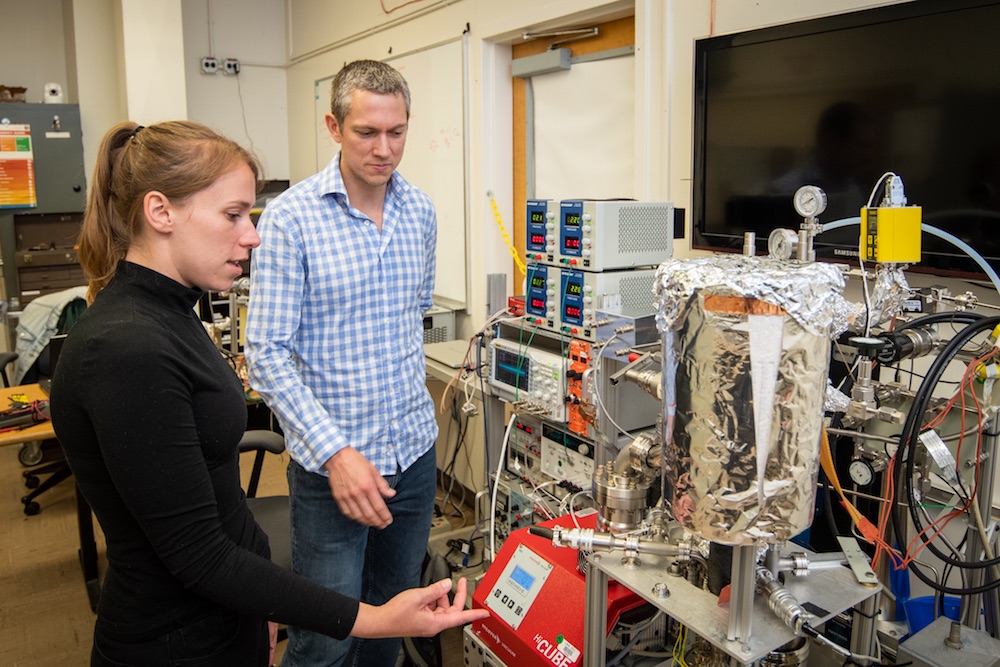Two scientists at Lawrence Berkeley National Laboratory (Berkeley Lab) have been selected by the U.S. Department of Energy’s Office of Science to receive significant funding for research through its Early Career Research Program.
The program, now in its tenth year, is designed to bolster the nation’s scientific workforce by providing support to exceptional researchers during the crucial early career years, when many scientists do their most formative work. The two Berkeley Lab recipients are among a total of 73 recipients selected this year, including 27 from DOE’s national laboratories.
The scientists are each expected to receive grants of up to $2.5 million over five years to cover year-round salary plus research expenses.
This year’s awardees and their projects are listed below.

Berkeley Lab physicist Peter Sorensen with intern Katherine Dunne. (Credit: Thor Swift/Berkeley Lab)
Peter Sorensen is a senior scientist in the Physics Division who has worked on dark matter search experiments, including the Large Underground Xenon (LUX) experiment and the follow-up LUX-ZEPLIN experiment, which is now under construction at the Sanford Underground Research Facility in South Dakota.
Physicists know dark matter makes up most of the matter in the universe because of its observed gravitational effects, though its makeup remains a mystery. While LUX and LUX-ZEPLIN dark matter detectors are designed to detect dark matter particle interactions based on light and electrical signals in liquid xenon, Sorensen’s award, “tagging radon daughter backgrounds in a crystalline xenon time projection chamber (TPC): a solid future for the LZ dark matter search experiment,” will support his research efforts to develop a dark matter detector using a solid, crystalline form of xenon.
This type of detector offers a couple advantages to liquid xenon detectors, Sorensen notes, including the ability to recognize and tag contamination from radon embedded in the crystal. This should help to mitigate its effects in data-taking.
Charuleka Varadharajan is a research scientist in the Earth and Environmental Sciences Area with interdisciplinary expertise in biogeochemistry and data sciences. She is the deputy lead of the ESS-DIVE data repository, a co-lead of the Watershed Function Scientific Focus Area and Next Generation Ecosystem Experiments-Tropics data management teams, and a senior fellow at the Berkeley Institute for Data Science. Her award is for her work in “investigating the impacts of streamflow disturbances on water quality using a data-driven framework.”
The project will determine how the intensity, duration, and frequency of streamflow disturbances will change water quality at the impacted locations and downstream. It will employ a novel data-driven framework to integrate extensive data from across the continental U.S. and use advanced analytical and machine-learning techniques to predict the resistance and resilience of water quality to different types of disturbance events.
Her analysis will account for differences in disturbance types and watershed characteristics, including geomorphology, geology, climate, vegetation, and land use. It will focus specifically on the Colorado, Columbia, and Delaware River corridors, which experience a range of drought to flood conditions, and for which extensive monitoring data are available. The outcome of this work will yield new predictions of how climate factors and extreme perturbations to streamflow interact with watershed characteristics to impact water quality.
Additionally, David Limmer, a Faculty Scientist in Berkeley Lab’s Materials Sciences Division, received an Early Career award through his UC Berkeley affiliation. Limmer was cited for his research, “Understanding and Controlling Photoexcited Molecules in Complex Environments.”
For more information on all the winners and the award, go here.
###
Founded in 1931 on the belief that the biggest scientific challenges are best addressed by teams, Lawrence Berkeley National Laboratory and its scientists have been recognized with 13 Nobel Prizes. Today, Berkeley Lab researchers develop sustainable energy and environmental solutions, create useful new materials, advance the frontiers of computing, and probe the mysteries of life, matter, and the universe. Scientists from around the world rely on the Lab’s facilities for their own discovery science. Berkeley Lab is a multiprogram national laboratory, managed by the University of California for the U.S. Department of Energy’s Office of Science.
DOE’s Office of Science is the single largest supporter of basic research in the physical sciences in the United States, and is working to address some of the most pressing challenges of our time. For more information, please visit energy.gov/science.
